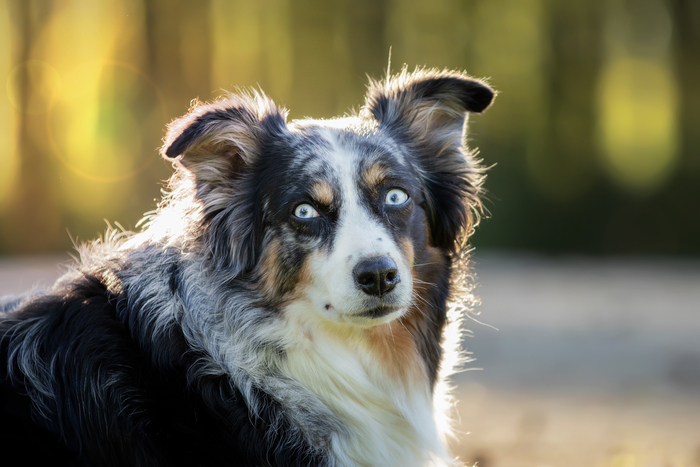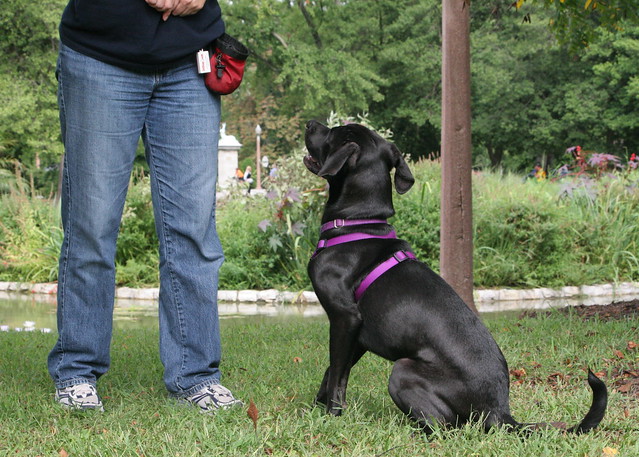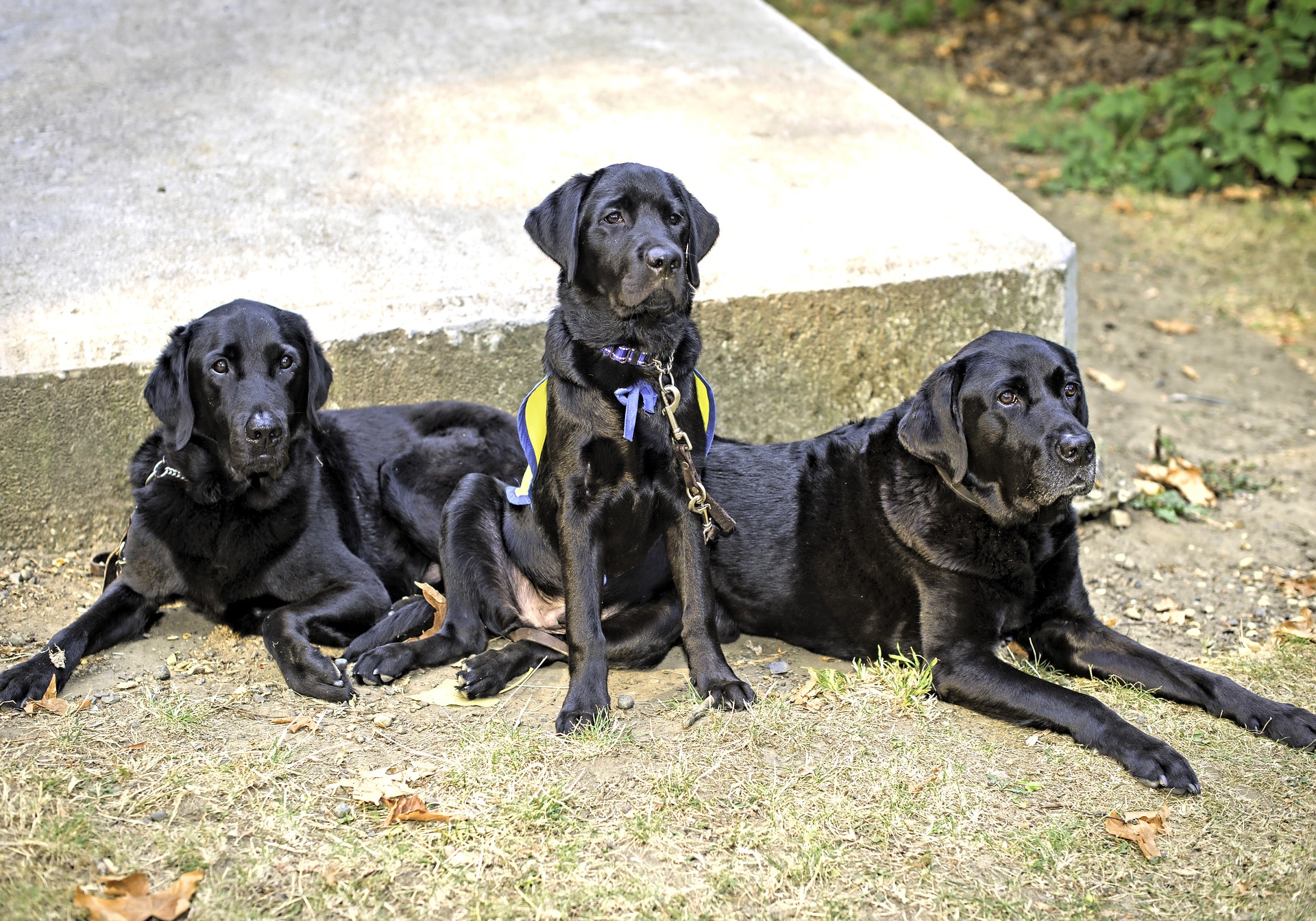
What are your criteria for choosing a dog? We all want our paw friends to be smart, cuddly, friendly, people-oriented, trainable… These are among the most common traits we are looking for in a pup. When we become parents, things might change a little when it comes to our criteria for choosing a dog. “Getting along with kids” is likely to become one of the requirements our future paw friend has to meet to be welcome in our family.
Australian Shepherds, also known as Aussies, are a popular breed of herding dogs that are known for their great qualities such as intelligence, loyalty, and trainability. We can not deny how gorgeous these dogs are!
However, whether Aussies can get along with children and become good family pets or not, is a question we will answer today.

History
The breed originates in North America, where it was brought to herd Spanish herds in the 16th century. It is thought, that a mountain sheepdog known as Carea Leones, a Basque Shepherd Dog, and a Pyrenean Sheepdog might have been among the breed ancestors.
However, the modern Australian Shepherd Dog, also known as Aussie, actually developed in the 19th century in California. The breed’s name may cause many of you to suggest that the breed originates in Australia. It actually can be tracked down to different types of herding dogs, including Collies, that were imported with sheep from New Zealand and Australia.
Physical Characteristics and Lifespan
Australian Shepherds are medium-sized dogs, whose height can reach up to 51-58 cm / 21-23 inches in male dogs and 46-54 cm / 18-21 inches in female dogs.
The average lifespan of the breed is about 13-15 years.
These wonderful dogs are double-coated, and their coat is moderately long. It can be seen in different color varieties including red, black, red, and blue merle. They can also have markings such as white markings, tan points, or both of them.
Personality
We will take a look at the personality of the Australian Shepherd based on several factors such as intelligence, trainability, energy levels, levels of barking, and physical/mental stimulation.
If you are an owner of an Aussie, you can be proud of the reputation of the breed’s representatives, namely very intelligent dogs. Considering the intelligence of these dogs, we can confidently say that they are highly trainable. Aussies can excel in obedience training, agility, and other canine sports.
They respond well to positive reinforcement training methods and are eager to please their owners. However, they can also be stubborn and willful at times, which requires consistent training and socialization to prevent behavioral problems.
Due to their intelligence, Aussie dogs need regular physical and mental stimulation, that will help them stay active, and fit and spend their energy in a constructive way. If you do not have time or willingness to engage in play sessions with your paw friend, provide them with toys, exercise them, train them, or otherwise be an active part of their life, you should opt for a low-maintenance breed.
The Australian Shepherd dogs are highly energetic and playful which can remain as their trait, even in their elderly life stage. This means that you may need to train and exercise your paw friend during their entire lifespan.
When it comes to barking-they are considered moderate barkers, or simply put- as a normal dog, your Aussie can occasionally bark. They may bark to greet someone or express their emotions.
Social Aspects
Aussies can develop very strong bonds with their owners which can make them be overprotective. Also, separation anxiety is a potential behavioral issue that your beloved dog can develop if regularly left home alone and not trained properly. Luckily, Aussies are very smart dogs, as already mentioned, which makes them easy to train.
When it comes to interacting with unfamiliar people, these dogs are rather reserved and wary. They belong to the herding group, which implies that they have great potential as watchdogs. When it comes to adaptability- they are adaptive to living in various environments. However, regular exercise will be needed, especially if you live in an apartment and opt for a representative of this breed to be your pet.
Are Australian Shepherds Good with Kids?
You may already have a good idea of what the personality of the Aussie dog is and what you can expect from a dog of that breed if you decide to raise one (or maybe more than one). Of course, every dog is different and not all breed characteristics automatically apply to all breed representatives. Always consider your dog an individual.
The Australian Shepherd dogs can become excellent family pet dogs and be your and your children’s most loyal companion! Also, their protective instinct can make them great watchdogs! However, being protective and having a strong herding instinct can also cause some trouble…
Australian Shepherd (Aussie) and Children- Benefits
Loyalty, intelligence, playfulness, eagerness to please, and trainability - all these qualities can make an Aussie dog a perfect companion for your child! Playing all day long with your child, protecting it, and being always by its side are invaluable traits of a dog!
If you are ready to invest time and put effort into training your Aussie in basic obedience or more advanced tasks, you can help them become a very well-socialized and well-mannered family member! Whether you live in a rural or an urban area, your dog will be able to adapt and provide you and your kids with unconditional love!
We also have to mention that being actively engaged in dog training, and exercising can have a very positive effect on your children’s behavior too. They will learn how to properly interact with a dog, and be patient, consistent, and even more disciplined. Aussie dogs are also known as healthy dogs, so you are not likely to spend a lot of money on vet visits.
Australian Shepherd (Aussie) and Children - Potential Problems
As you may have already figured out, the protective and herding nature of Aussie dogs can be problematic, especially if you have small children. Your paw friend may try to “herd” your kid and even chase it or nip it, especially if it moves too fast.
Another potential issue is the breed's high energy levels, which can make them difficult to manage for families who are not able to provide enough exercise and stimulation. Without being provided with opportunities to play and exercise, Australian Shepherds can become bored and destructive, which can be stressful for both the dog and the whole family.
This behavior can be addressed, but only if you are ready to invest time in training and exercising your dog. If you can not spend enough time with your dog and take care of their physical and mental stimulation, you’d better opt for a dog breed that is less energetic and does not have so strong herding instinct.
Additionally, Australian Shepherds can be prone to separation anxiety, which can manifest in destructive types of behavior when left alone for extended periods of time. This can be particularly challenging for families with young children, who may not be able to provide the level of attention and interaction that their dog needs.
Aussie dogs are known as generally healthy dogs, but this does not mean that they can not develop health conditions. Epilepsy, elbow and hip dysplasia, progressive retinal atrophy, and deafness are among the health issues your paw friend might be prone to.

Tips on How to Raise an Australian Shepherd with Kids
If you are considering getting an Australian Shepherd as a family pet, there are several tips that may help you ensure that your dog and your children will have a positive and safe relationship.
First, it is important that you socialize your Australian Shepherd dog from a young age. This means exposing your paw friend to various surroundings, other animals, and people in a controlled and positive way. Socialization can help your dog to become more confident and adaptable and reduce the risk of behavioral problems.
Second, it is important to provide your Australian Shepherd with enough exercise and mental stimulation. This can include regular walks, runs, or hikes, as well as playtime with toys and games that challenge their mind and improve their problem-solving skills. Providing enough exercise and stimulation can help prevent boredom and destructive behavior, and promote a healthy and happy relationship between your dog and your family.
Third, training your dog how to behave appropriately is important, but teaching your children how to properly interact with your dog is important as well. Children need to know how to treat animals in a gentle and respectful manner. You may want to teach your child to not approach your dog when they are eating or sleeping. Also, gently petting and hugging, as well as playing with them without provoking them, will contribute to building a strong bond between your children and your Aussie.
Last but not least, it is important to provide your Australian Shepherd with a safe and comfortable space where they can rest and relax when they need some time alone. This can be a crate, a bed, or a designated area of the house where your dog will feel safe and comfortable.
Australian Shepherds can make excellent family pets, but they (just like all dogs) require their owners to be committed and provide them with enough exercise, socialization, and training. While they are generally good with children, their herding instincts and high energy levels can sometimes make them challenging to manage at home.
By taking the time to understand the breed's unique characteristics and needs, and by providing a safe and positive environment for your dog and your family, you can ensure that the relationship between your Aussie and your children will be happy and healthy.












